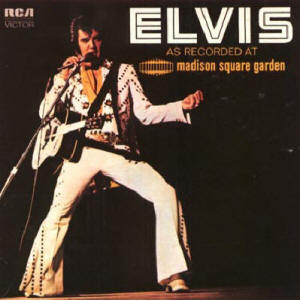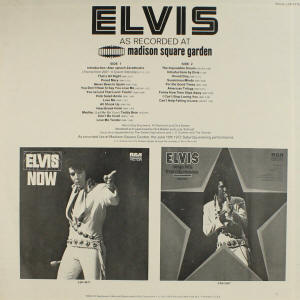

Even though CAMDEN had released "Elvis Sings
Hits From His Movies - Volume 1" on June 1, 1972
RCA Victor issued "Elvis As Recorded At Madison
Square Garden" just seventeen days later. In its
initial sales period the album moved 500,000
copies and was listed on Billboard's "Top LPs
Chart" for 34 weeks. It peaked at number 11 and
just two months after the first units had been
shipped a Gold Award was presented to the king
by the RIAA. Posthumously the organization
updated the status to Platinum (1988), Double
Platinum (1992) and Tripple Platinum (1999).
Outside the US "Elvis As Recorded At Madison
Square Garden" was most successful in Australia
and Great Britain, where it made it to number 3
of the charts. In total the album sold over five
million copies, which translates to 750 million
paid streams according to the RIAA. This was
twice as much as the king's recent gospel album
"He Touched Me" and five times as much as the
previously released "Elvis Now".
In 2016 the complete Presley catalogue was
restored and remastered by Vic Anesini for a
boxed set of 60 compact discs called "The Album
Collection". Sony Music Entertainment provides
the streaming platforms with the same versions
of the individual albums (some of them offering
bonus tracks), albeit in 24 bit/90 khz flac.
That means, if the platform of your choice
supports high resolution audio, you can enjoy
the tracks in the same quality Sony used to scan
and master them. On Spotify, which has a market
share of approximately 30% and is the only
platform that publishes streaming figures,
"Elvis As Recorded At Madison Square Garden"
accumulates 608 million streams. The remixed
version "Prince From Another Planet" adds
another 34 million requests.
The sleeve of the king's current single "An
American Trilogy" / "The First Time Ever I Saw
Your Face" announced an album named "Standing
Room Only". Because of the media hype it was
decided to cancel the planned longplayer and
release one of the Madison Square Garden shows
instead. To save time RCA Victor simply used the
cover art of the planned album and changed the
title. The back cover promoted the brand new
budget release "Elvis Sings Hits From His Movies
- Volume 1" and the full price album "Elvis
Now", which had been brought into the stores
earlier this year.
On June 10, 1972 RCA Victor recorded the
matinee performance as well as the evening show.
Because of Felton Jarvis' renal disease Joan
Deary and Harry Jenkins acted as producer, the
engineering was done by Al Pachucki and Dick
Baxter. The band consisted of James Burton
(guitar), John Wilkinson (guitar), Charlie Hodge
(guitar and harmony vocals), Jerry Scheff
(bass), Ronnie Tutt (drums) and Glen D. Hardin
(piano). Joe Guercio didn't conduct his own
orchestra, but the Joe Malin Orchesra. The
harmony voices were provided by J.D. Sumner &
The Stamps Quartet (J.D. Sumner, Ed Enoch, Bill
Baize, Richard Sterben and Donnie Sumner), The
Sweet Inspirations (Estelle Brown, Sylvia
Shemwell and Myrna Smith) as well as Kathy
Westmoreland. After it was decided to release
the evening show the recording was mastered the
very next day. To fit the show on a single album
the tape was sped up a little. With a running
time of 52:30 minutes "Elvis As Recorded At
Madison Square Garden" is the longest album of
the king. By the way: When I refer to the tempo
of the songs in my review, I am referencing to
the actual recording, not the sped up version.
While the vinyl album runs too fast, all
other releases feature the concert at its
correct speed. This also applies to later vinyl
editions, where the recording was spread over
two records. In 2012 Sony Music
Entertainment released a set of two compact
discs and a dvd. For this project the recordings
of the matinee show and the evening concert were
newly mastered and mixed, the dvd included a
short documentary and 8mm footage. The audio of
this set, it is named "Prince From Another
Planet", is also available on the streaming
platforms and is the best sounding source of the
shows. A review of the boxed set can be found
HERE.
Also Sprach ZarathustraThe
concert starts with the first part of the
symphonic poem by Richard Strauss. The classical
piece from 1896 creates a tense expectation
which suddenly releases into a rataplan, that
leads to a rhythmical "Opening Riff" to which
Elvis enters the stage.
That's All Right
Without any break the band moves on to "That's
All Right", the first single of the king. By now
the tempo is much faster and the song sounds
more like Vegas than like country & western. The
combination of the classic "Einleitung, Oder
Sonnenaufgang" and the dynamic "That's All
Right" is a perfect start for a Presley concert.
Proud Mary
Two years earlier "Proud Mary" had been released
on the album "On Stage - February 1970". Since
then the arrangement has changed and the tempo
is much higher. I like this version better than
the first one.
Never Been To Spain
Here we get the first new song of the album.
It's not really new, because two years before
Three Dog Night had scored a hit with Hoyt
Axton's composition, but Elvis hadn't recorded
it before. I like this song a lot, because the
lyrics have more than just a touch of irony and
the chorus gives the king a chance to display
his incredible voice.
You Don't Have To Say You Love Me
In late 1970 Elvis had scored a top 20 hit with
his studio recording of "You Don't Have To Say
You Love Me", now the fans got a live version.
The king still delivers the song with power, but
for my taste it's played a tad too fast and
Elvis sings somewhat sloppy at times. It's not a
bad performance at all, but the studio recording
is better.
You've Lost That Lovin' Feeling
The album "That's The Way It Is" features a
great live version, taped in Las Vegas in August
1970. Two years later at New York's Madison
Square Garden Elvis still sings "You've Lost
That Lovin' Feeling" well, but somehow he seems
to have lost the feeling for the song. It's less
emotional, a bit too fast and a tad too slick.
Polk Salad Annie
Tony Joe White's "Polk Salad Annie" is without
doubt one of the highlights of the album "On
Stage - February 1970". It's still a very good
performance, but once again Elvis had increased
the speed and changed the arrangement. The
spoken introduction is left out, therefore we
get a nice bass solo by Jerry Scheff. My
impression is that the king had substituted
finesse with force.
Love Me
By 1972 there is not much left of the heartache.
Elvis performs the ballad too fast and almost
free of emotion. The audience loves it
nevertheless.
All Shook Up
Once again the speed is very high and the song
sounds vastly different to the recording
released in 1957. However, the arrangement fits
to the tempo of the show and for some unknown
reason I like this highspeed-version. It's the
second live recording of "All Shook Up", the
first one was released in 1969 on the double
album "From Memphis To Vegas / From Vegas To
Memphis".
Heartbreak Hotel
This one is also played faster and lacks the
suicidal mood of the original recording. But
still Elvis manages to give his first number 1
hit a bluesy touch and delivers a good,
modernized performance.
Teddy Bear / Don't Be Cruel
Both songs are presented with a foot on the gas
pedal, but the medley works well this way.
Love Me Tender
By now it's no surprise that Elvis has increased
the tempo of the song. He sings it quite sloppy
and it's obvious that "Love Me Tender" isn't one
of his favorites. Of course the audience doesn't
care and the ladies scream as if they were in
their teenage years again.
The Impossible Dream
The song from the musical "Man Of La Mancha" is
performed much better. It gives Elvis an
opportunity to use his voice to the full extend
and also display the abilities of the orchestra
and the choir. "The Impossible Dream" is the
second song on this album, that has never been
recorded by the king before. By the way: It was
written by Mitch Leight and Joe Darion.
Introductions
Elvis introduces his band and the harmony
singers.
Hound Dog
At first the king performs a slow version of the
rock'n'roll classic, then he continues in
highspeed-mode. But he doesn't sing the whole
song, he simply repeates the same four lines
over and over again. The performance has nothing
to do with the classic single from 1956, it's
even far away from the version released on "From
Memphis To Vegas / From Vegas To Memphis". In
1969 he also sang just a part of the lyrics, but
this small piece rocked like hell. By now "Hound
Dog" is pure routine. But it's no surprise that
the audience loves every second of it.
Suspicious Minds
Once again Elvis' can't compete with his version
from the aforementioned double album. The
roughness and energy of 1969/70 simply is
missing. However, that doesn't mean the
performance is bad or lacks drive. The king
still presents the song in a powerful and
entertaining way. Just not as great as two or
three years earlier.
For The Good Times
This ballad is the third song of the album, that
hadn't been recorded by Elvis before. "For The
Good Times" was written and released by Kris
Kristofferson in 1970. The king performs it very
well and it's obvious that he likes this kind of
music. In 1977 RCA re-used the track on the
album "Welcome To My World".
An American Trilogy
Here we get to hear Elvis' recent single. At the
start a lady screams his name to which the king
replies "what?" in squeaky voice. After this
joke he performs a serious, vocally stunning
version of the medley. Without doubt this is the
highlight of the album.
Funny, How Time Slips Away
The ballad was released in early 1971 on the
album "Elvis Country - I'm 10,000 Years Old". On
stage the song is played faster and sung with
less emotion. However, the gimmick is to have
the house lights turned up so that Elvis can
interact with the audience.
I Can't Stop Loving You
This one was also known from the double album
"From Memphis To Vegas / From Vegas To Memphis"
(1969). In 1972 Elvis isn't as rough and wild,
but still powerful and it's obvious that he
likes the song.
Can't Help Falling In Love
Because Elvis closed almost all of his shows
with "Can't Help Falling In Love", the ballad is
also included on his first live album. I don't
like any of his concert performances, because
they are all played too fast and they are all
sung without any emotional depth. But that's not
the point. The audience knows that this is the
final song, Elvis shakes the last few hands,
throws his final scarf into the auditorium and
poses with his stretched out cape for the last
pictures. Seamlessly the band has moved on to
the "Closing Riff" to which the king ultimately
leaves the building.
Verdict
The selection and sequencing of the songs
is perfect, the tempo is high and Elvis is
in fine voice. However, some songs are
performed with a tad too much routine and it
doesn't speak for the artist to agree to
release a sped up recording.

(C) RCA Records
![]()

